湖北省北大附中武汉为明实验学校九年级英语全册 Unit 2 I think that moonc
- 格式:ppt
- 大小:3.57 MB
- 文档页数:30
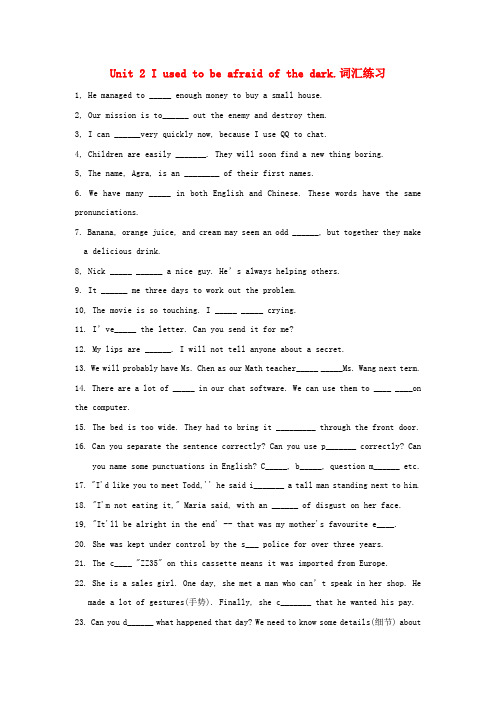
Unit 2 I used to be afraid of the dark.词汇练习1, He managed to _____ enough money to buy a small house.2, Our mission is to______ out the enemy and destroy them.3, I can ______very quickly now, because I use QQ to chat.4, Children are easily _______. They will soon find a new thing boring.5, The name, Agra, is an ________ of their first names.6. We have many _____ in both English and Chinese. These words have the same pronunciations.7. Banana, orange juice, and cream may seem an odd ______, but together they makea delicious drink.8, Nick _____ ______ a nice guy. He’s always helping others.9. It ______ me three days to work out the problem.10, The movie is so touching. I _____ _____ crying.11. I’ve_____ the letter. Can you send it for me?12. My lips are ______. I will not tell anyone about a secret.13. We will probably have Ms. Chen as our Math teacher_____ _____Ms. Wang next term.14. There are a lot of _____ in our chat software. We can use them to ____ ____on the computer.15. The bed is too wide. They had to bring it _________ through the front door.16. Can you separate the sentence correctly? Can you use p_______ correctly? Canyou name some punctuations in English? C_____, b_____, question m______ etc.17. "I'd like you to meet Todd,'' he said i_______ a tall man standing next to him.18. "I'm not eating it," Maria said, with an ______ of disgust on her face.19, "It'll be alright in the end' -- that was my mother's favourite e____.20. She was kept under control by the s___ police for over three years.21. The c____ "ZZ35" on this cassette means it was imported from Europe.22. She is a sales girl. One day, she met a man who can’t speak in her shop. Hemade a lot of gestures(手势). Finally, she c_______ that he wanted his pay.23. Can you d______ what happened that day? We need to know some details(细节) aboutit.1, He managed to save enough money to buy a small house.2, Our mission is to seek out the enemy and destroy them.3, I can type very quickly now, because I use QQ to chat.4, Children are easily bored. They will soon find a new thing boring.5, The name, Agra, is an acronym of their first names.6. We have many homophones in both English and Chinese. These words have the samepronunciations.7. Banana, orange juice, and cream may seem an odd combination, but together they make a delicious drink.8, Nick sounds like a nice guy. He’s always helping others.9. It took me three days to work out the problem.10, The movie is so touching. I can’t help crying.11. I’ve sealed the letter. Can you send it for me?12. My lips are sealed. I will not tell anyone about a secret13. We will probably have Ms. Chen as our Math teacher instead of Ms. Wang next term.14. There are a lot of emotives in our chat software. We can use them to make faceson the computer.15. The bed is too wide. They had to bring it sideways through the front door.16. Can you separate the sentence correctly? Can you use punctuations correctly?Can you name some punctuations in English? Colon, bracket, question mark etc.17. "I'd like you to meet Todd,'' he said indicating a tall man standing next to him.18. "I'm not eating it," Maria said, with an expression of disgust on her face. 19, "It'll be alright in the end' -- that was my mother's favourite expression.20. She was kept undercontrol by the secret police for over three years.21. The code "ZZ35" on this cassette means it was imported from Europe.22. She is a sales girl. One day, she met a man who can’t speak in her shop. Hemade a lot of gestures. (手势)Finally, she comprehended that he wanted his pay.23. Can you describe what happened that day? We need to know some details(细节) about it.。
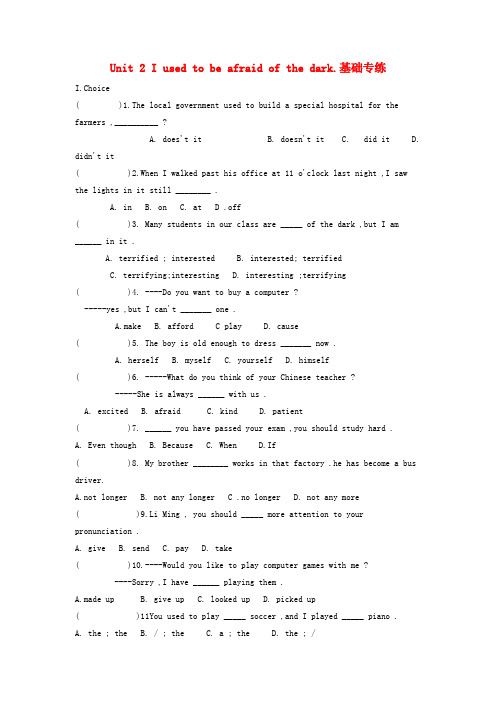
Unit 2 I used to be afraid of the dark.基础专练I.Choice( )1.The local government used to build a special hospital for the farmers ,__________ ?A. does't itB. doesn't itC. did itD. didn't it( )2.When I walked past his office at 11 o'clock last night ,I saw the lights in it still ________ .A. inB. onC. at D .off( )3. Many students in our class are _____ of the dark ,but I am______ in it .A. terrified ; interestedB. interested; terrifiedC. terrifying;interestingD. interesting ;terrifying( )4. ----Do you want to buy a computer ?-----yes ,but I can't _______ one .A.makeB. afford C play D. cause( )5. The boy is old enough to dress _______ now .A. herselfB. myselfC. yourselfD. himself( )6. -----What do you think of your Chinese teacher ?-----She is always ______ with us .A. excitedB. afraidC. kindD. patient( )7. ______ you have passed your exam ,you should study hard .A. Even thoughB. BecauseC. WhenD.If( )8. My brother ________ works in that factory .he has become a bus driver.A.not longerB. not any longer C .no longer D. not any more( )9.Li Ming , you should _____ more attention to your pronunciation .A. giveB. sendC. payD. take( )10.----Would you like to play computer games with me ?----Sorry ,I have ______ playing them .A.made upB. give upC. looked upD. picked up( )11You used to play _____ soccer ,and I played _____ piano .A. the ; theB. / ; theC. a ; theD. the ; /( )12. It was very hot when we got to the People's Park, _________ we still had a good time there .A. orB.soC. butD.and( )13.---Is Mr Wang short ?---- No, he isn't . He is ________ .A. tallB. thinC.heavyD.beautiful( )14. Uncle Li sits _________ me . He is a driver .A. in front ofB. in the front ofC. in frontD. in the front( )15.I can't believe _____ little girls can write ________ many books .A. so ;soB. such ;suchC. so;suchD. such ;so( )16. It was sunny and hot _______ .A. all the dayB. all day Call days D. the all days( )17.His mother is very busy .She spends much time ________ housework .A. to doB. doesC. doingD. do( )18.I really _______ my friend Tom .He moved to another city .A.want B .bring C.catch D. miss( )19.This film is very _______ .We are ________ in it .A.interesting ;interestingB. interested ;interestedC. interesting ;interested D .interested ;interesting( )20.. The medical team is ______ ten doctors .A.made ofB.made fromC. made intoD.made up of21我昨天花了5 个小时运动。

Unit 2 I used to be afraid of the dark句型归纳复习1.过去常常___________2.习惯于做…___________3.被用来做…___________4.被某人使用___________5.他长什么样?_____________________6.他过去长什么样?_____________________7.开始上学___________8.在担心_______________9.一直____________10.走到学校__________________11.乘公共汽车____________12.我最大的问题_______________________13.现在___________14.起床早_____________15.整天呆在学校_______________16.直接回家____________________17.某人花时间或钱做某事__________________18.不再_____________19.同某人聊天________________20.带某人去听音乐会______________21.几乎没有_______________22.我的变化真大_________________23.时间如飞____________________24.在过去的几年时间里_______________________25.我的日常生活____________________26.使你紧张_______________27.加入某人_______________28.参加…(活动)______________29.移居到…___________30.留长发_________________31.他似乎很累_________________32.制造许多麻烦___________________33.得低分__________________34.一个15岁的孩子__________________35.问题儿童________36.最近的一次谈话____________________37.负担不起…___________________38.支付,付款_________________39.照顾某人___________40.照顾好某人_____________41.对学习感兴趣______________42.闯祸进警局___________________43.对…有耐心__________________44.放弃做某事_________________45.最后__________________46.做决定________________47.送某人去…________________48.某人有必要做某事___________________49.令某人惊奇的是_________________50.即使___________51.以…为自豪____________________52.迫使某人做…__________________53.对…注意___________________54.全神贯注_________________55.父母的存在对孩子来说非常重要_________________________________________________________56.对自己有信心___________57.男子寄宿学校_____________ed to do …2.be used to doing …3.be used to do …4.be used by sb.5.What does he look like?6.What did he use to look like?7.start school8.be worried about9.all the time /always 10.walk to school 11.take t he bus 12.my biggest problem 13.these days /at present /now /at the moment 14.get up early 15.stay at school all day 16.go right home 17.sb. spend time doing sth 18.not any more/no longer 19.chat with sb. 20.take sb. to concerts 21.hardly ever 22.How I’ve changed! 23.How time flies! 24.in the last few years 25.my daily life/my everyday life 26.make you stressed out 27.join sb 28.take part in …/joi n in… 29.move to …30.grow hair long 31.He seems tired./He seems to be tired./It seems that he is tired.32.make lots of trouble/cause lots of trouble 33.get bad grades 34.a 15-year-old kid/a kid of 15 years old 35.a pro blem child 36.a recent conversation 37.can’t afford sth/can’t afford to do sth 38.pay for 39.take care of sb/look after sb 40.take good care of sb /look af ter sb well 41.be interested in studying 42.get into trouble with the police 43.be patient w ith…44.give up doing sth/s top doing s th 45.at last /in the end /finally 46.make a decision to do sth /decide to do sth 47.send stb to … 48.It’s necessary for sb to do sth 49.to one’s surprise 50.eventhough /even if 51.be proud of /take pride in 52.make sb do 53.pay attention to 54.pay full attention to…55.It’s very important for parents to be there for their children . 56.feel good about oneself 57.a boys’ boarding school。

Unit 2知识点汇总复习1. used to do sth. 过去常常做某事否定形式:didn’t use to do sth. / used not to do sth.如:He used to play football after school. 放学后他过去常常踢足球。
Did he use to play football? Yes, I did. No, I didn’t.He didn’t use to smoke. 他过去不吸烟。
2. 反意疑问句①肯定陈述句+否定提问如:Lily is a student, isn’t she?Lily will go to China, won’t she?②否定陈述句+肯定提问如:She doesn’t come from China, does she?You haven’t finished homework, have you?③提问部分用代词而不用名词 Lily is a student, isn’t she?④陈述句中含有否定意义的词,如:little, few, never, nothing, hardly等。
其反意疑问句用肯定式。
如:He knows little English, does he? 他一点也不懂英语,不是吗?They hardly understood it, did they?他们几乎不明白,不是吗?3. play the piano 弹钢琴4. ①be interested in sth. 对…感兴趣②be interested in doing sth. 对做…感兴趣如:He is interested in math, but he isn’t interested in speakingEnglish. 他对数学感兴趣,但是他对说英语不感兴趣。
5. interest ed adj. 感兴趣的,指人对某事物感兴趣,往往主语是人interest ing adj.有趣的,指某事物/某人具有趣味,主语往往是物6. still 仍然,还用在be 动词的后面如:I’m still a student.用在行为动词的前面如:I still love him.7. the dark 天黑,晚上,黑暗8. 害怕…be terrified of sth.如:I am terrified of the dog.be terrified of doing sth.如:I am terrified of speaking.9. on 副词,表示(电灯、电视、机械等)在运转中/打开,其反义词off. with the light on 灯开着10. walk to somewhere 步行到某处 walk to school 步行到学校11. spend 动词,表示“花费金钱、时间”①spend…on sth. 在某事上花费(金钱、时间)②spend…doing sth.花费(金钱、时间)去做某事如:He spends too much time on clothes. 他花费太多的时间在衣着He spend 3 months building the bridge.他花费了三个月去建这座桥。
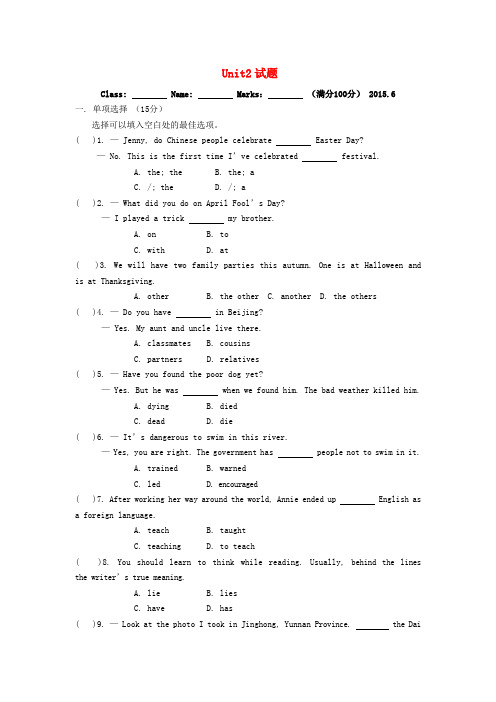
Unit2试题Class: Name: Marks:(满分100分) 2015.6一. 单项选择(15分)选择可以填入空白处的最佳选项。
( )1. — Jenny, do Chinese people celebrate Easter Day?—No. This is the first time I’ve celebrated festival.A. the; theB. the; aC. /; theD. /; a( )2. —What did you do on April Fool’s Day?— I played a trick my brother.A. onB. toC. withD. at( )3. We will have two family parties this autumn. One is at Halloween and is at Thanksgiving.A. otherB. the otherC. anotherD. the others( )4. — Do you have in Beijing?— Yes. My aunt and uncle live there.A. classmatesB. cousinsC. partnersD. relatives( )5. — Have you found the poor dog yet?— Yes. But he was when we found him. The bad weather killed him.A. dyingB. diedC. deadD. die( )6. —It’s dangerous to swim in this river.—Yes, you are right. The government has people not to swim in it.A. trainedB. warnedC. ledD. encouraged( )7. After working her way around the world, Annie ended up English as a foreign language.A. teachB. taughtC. teachingD. to teach( )8. You should learn to think while reading. Usually, behind the lines the writer’s true meaning.A. lieB. liesC. haveD. has( )9. — Look at the photo I took in Jinghong, Yunnan Province. the Daipeople were having!— Wow! They were celebrating the Water Festival.A. What funB. How funC. What a funD. How a fun( )10. After a 3-week winter vacation, students usually some weight when they return to school.A. put awayB. put upC. put inD. put on( )11. — The Dragon Boat races are so exciting, but our boat is still behind.—Don’t worry. I am sure our team will win!A. ifB. thatC. whetherD. why( )12. — Could you tell me something about Valentine’s Day in Japan?— Well, not only adults children celebrate it.A. butB. andC. althoughD. because( )13. — Will we have dinner at the Hope Restaurant?—Maybe. We’ll go there if the show before 6. But I don’t know if thereany free tables then.A. will end; wereB. will end; will beC. ends; wereD. ends; will be( )14. — Can you spare time to come to our Thanksgiving party?—Well, I don’t knowA. that I can finish my work by thenB. if can I finish the work by thenC. whether I can finish the work by thenD. that can I finish the work by then( )15. — I am going back to America for Thanksgiving Day.—. And we will miss you.A. Enjoy yourselfB. You’re welcomeC. That’s interestingD. The same to you二. 完形填空(10分)阅读下列短文,选择可以填入空白处的最佳选项。
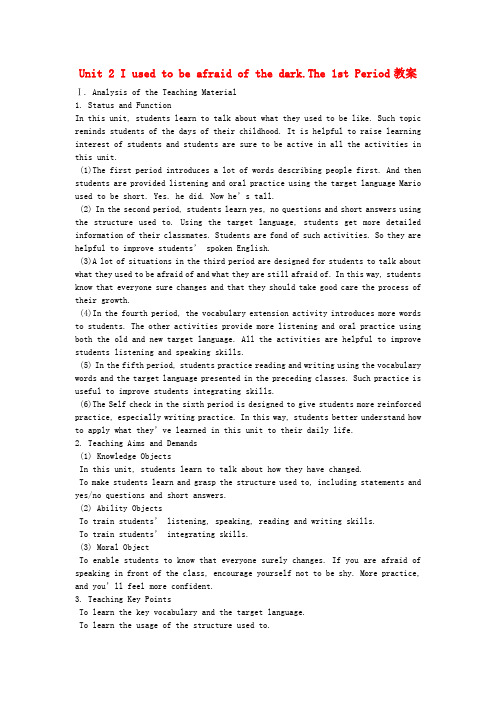
Unit 2 I used to be afraid of the dark.The 1st Period教案Ⅰ. Analysis of the Teaching Material1. Status and FunctionIn this unit, students learn to talk about what they used to be like. Such topic reminds students of the days of their childhood. It is helpful to raise learning interest of students and students are sure to be active in all the activities in this unit.(1)The first period introduces a lot of words describing people first. And then students are provided listening and oral practice using the target language Mario used to be short. Yes. he did. Now he’s tall.(2) In the second period, students learn yes, no questions and short answers using the structure used to. Using the target language, students get more detailed information of their classmates. Students are fond of such activities. So they are helpful to improve students’ spoken English.(3)A lot of situations in the third period are designed for students to talk about what they used to be afraid of and what they are still afraid of. In this way, students know that everyone sure changes and that they should take good care the process of their growth.(4)In the fourth period, the vocabulary extension activity introduces more words to students. The other activities provide more listening and oral practice using both the old and new target language. All the activities are helpful to improve students listening and speaking skills.(5) In the fifth period, students practice reading and writing using the vocabulary words and the target language presented in the preceding classes. Such practice is useful to improve students integrating skills.(6)The Self check in the sixth period is designed to give students more reinforced practice, especially writing practice. In this way, students better understand how to apply what they’ve learned in this unit to their daily life.2. Teaching Aims and Demands(1) Knowledge ObjectsIn this unit, students learn to talk about how they have changed.To make students learn and grasp the structure used to, including statements and yes/no questions and short answers.(2) Ability ObjectsTo train students’ listening, speaking, reading and writing skills.To train students’ integrating skills.(3) Moral ObjectTo enable students to know that everyone surely changes. If you are afraid of speaking in front of the class, encourage yourself not to be shy. More practice, and you’ll feel more confident.3. Teaching Key PointsTo learn the key vocabulary and the target language.To learn the usage of the structure used to.4. Teaching Difficult PointsTo improve students’ listening, speaking, reading and writing skills.To enable students to grasp the usage of the structure used to.5. Studying WayTeach students how to use the structure used to to compare the past with now. Ⅱ. Language FunctionTalk about what you used to be like.Ⅲ. Target Language1. Mario used to be short.Yes, he did. Now he’s tall.2. I used to eat candy all the time. Did you?Yes, I did. And I used to chew gum a lot.Ⅳ. Structures1. Used to2. Conjunction butⅤ. Vocabularyused to, dark, spider, insectⅥ. Recyclingalone, quiet, snake, outgoing, friendly, serious, funny, tall, shy, short, straight, long hairⅦ.Learning Strategies1. Brainstorming2. ComparingⅧ.Teaching TimeSeven PeriodsThe First PeriodⅠ.Teaching Aims and Demands1.Knowledge Objects(1)Key Vocabularyused to, dark(2)Target LanguageMario used to be short.Yes, he did. Now he’s tall.2. Ability Objects(1) Train students’ listening skill.(2) Train students’ communicative competence.3.Moral ObjectDon’t judge a person by his appearance.Ⅱ.Teaching Key Points1. Target language2. The structure: used toⅢ. Teaching Difficult PointThe structure: used toⅣ. Teaching Methods1. Teaching by induction2. PairworkⅤ. Teaching Aids1. A tape recorder2. Pictures of people cut out from magazines or newspapersⅥ. Teaching ProceduresStep Ⅰ Revision(1) Check the homework exercises.(2) Ask some individual students their ways of learning English.T: How do you learn English, A?S A: I learn English by listening to cassettes.T: What about you, B?S B: I study with a group.T: Do you learn English by practicing conversations with friends, C?S C: Yes, I do. I think it helps.T:…Step Ⅱ 1aThe activity introduces tile key vocabulary. Call students’attention to the chart with the headlines Appearance and Personality.Say, You are to fill in the chart with words describing people. The words under Appearance will describe how people look and the words under Personality will describe what people are like. Ask two students to say the sample answers. Then elicit one answer to each column from the class.Get students to fill in the chart individually.Check the answers by asking different students to read their lists to the class. Make sure that all the students understand what each word means.Note: Answers will vary from the sample answers below.Sample answersAppearance: tall, straight hair, long hair, short hair, curly hair, short, fat, thin, slim, good-looking, prettyPersonality: outgoing, funny, quiet, kind, warm-hearted, friendly, shy, easygoing Step Ⅲ 1bThe activity gives students practice in understanding the target language in spoken conversation.Write two dates side by side on the blackboard. The first is today’s date, including the year, and the second is the same day, but ten years ago.Ask a student to stand up. Use words or phrases to describe that student now. Ask students to suggest words Or phrases that describe him/her ten years ago.T: Liu Chang is tall now. Was she tall ten years ago?S1: No, she was short.T: She has long hair. Did she have long hair ten years ago?S2: No, she has short hair. (You may wish to ask Liu Chang to answer the question) T: …Ask some more questions and add more examples to both columns.Ensure that the blackboard ends up like this:Sep. 10,2004 Sep. 10,1994Tall shortlong hair short hair……Say, we use "used to" to talk about things that have changed.Write the following on the blackboard:Liu Chang used to be short, but she is tall now.She used to have short hair, but she has long hair now.Read the instructions to the class.Point out the sample answer. Say, You will hear someone in the recording say that Mario used to be short. Listen and fill in the other blanks with words you hear. Play the recording for the first time.Students only listen.Play the recording again. This time, students listen and fill in the blanks. Check the answers.AnswersMario used to be short. He used to wear glasses.Amy used to be tall. She used to have short hair.Tina used to have red and curly hair.TapescriptConversation 1Boy 1: Mario, is that you?Boy 2: Yeah it is. It’s Bob! Hey, guys, it’s Bob! I haven’t seen you in four years ! Boy 1: Yeah. I’m here with my parents.We’ve visiting for a couple of days. Wow, Mario, you look different! You used to be short, didn’t you?Boy 2: Yes, I did. NOW I’m tall. And so are you!Boy 1:That’s true…. And you used to wear glasses.Boy 2: You have a great memory. Now I wear contact lenses!Conversation 2Boy 1: Hey. Amy, it’s great to see you.Girl1: Hi, Bob. How are you?Boy 1: Fine. Wow, you’ve changed!Girl1: Really? How?Boy 1: Well, you used to have short hair.Girl 1: You remember that? Yes, I did.Boy 1: And you used to be really tall!Girl I: Not any more. You’re taller than me now, Bob.Conversation 3Girl 2: Hiya, Bob.Boy 1: Hi, Tina. You’ve changed too.Girl 2 :Oh, yeah?Boy 1: You have blond hair!Girl 2: Yeah, it used to be red, didn’t it?Boy 1: And it’s straight!Girl 2: It used to be curly.Step Ⅳ 1cThis activity provides oral practice using the target language.Read the instructions to the class.Call students’attention to the conversation in the box. Invite a pair of students to read it to the class.S A: Mario used to be short.S B: Yes, he did. Now he is tall.Write it on the blackboard. Then demonstrate a new conversation with another student. T: Mario used to wear glasses.S C :Yes, he did. Now he wears contact lenses.Say, look at the picture in Activity 1b.Have a conversation with a partner about people in the picture. Talk about how the People look now and how they used to look.As students work, listen in on various pairs checking progress and helping with pronunciation as needed.After students have had a chance to practice several exchanges, ask pairs to come the front of the room and act out their conversations.Step Ⅴ SummarySay, In this class, we’ve learned the key vocabulary words used to and dark. And we’ve also learned the target language Mario used to be short. Yes, he did. Now he’s tallStep Ⅵ HomeworkTake out the pictures of people cut out from magazines or newspapers. Hand them out to students. It’s better to find colorful, full-length photos. Ask students to write about the person in the picture as they are now and as they were ten years ago. Students may collect pictures and information of the person they like best. Then write a passage about the person.Step ⅦBlackboard Design。

Unit 2 I think that mooncakes are delicious.Exercise 3 (Grammar) (40分)班级: 姓名: 小组: 分数: Ⅰ. 基础过关题1.完成句子(共10分)1)“My father works in a bank.” Zhang Hui says. (2分) Zhang Hui says his father in a bank.2)“Do you have any rooms to rent?” She asked me. 2(分) She asked me I any rooms to rent.3)“I have bee n to Beijing,” Lucy said. (3分)Lucy said she to Beijing.4)告诉我你是什么意思?3分)Tell me .5)出租车司机问我想去哪里。
(3分)The taxi driver asked me to go.2.选择填空(共10分)( )1. clever girl she is!A. What aB. WhatC. How aD. How( )2. interesting story it is!A. What anB. What aC. How anD. How( )3. lovely children they are!A. WhatB. What aC. How aD. How( )4. flowers they are!A. What beautifulB. Wh at a beautifulC. How beautifulD. How a beautiful( )5. it is today!A. A. How coldB. What coldC. How a coldD. What a cold( )6. bad the weather is!A. HowB. WhatC. What aD. How a( )7. good news it is!A. HowB. What aC. How aD. What( )8. the sunshine is!A. What a brightB. How a brightC. How brightD. What bright ( )9. he writes!A. How goodB. How wellC. What goodD. What well( )10. Li Lei suns!A. What fast boyB. What fastC. How fastD. How a fastⅡ. 拓展提升题1.选择填空(共17分)()1. Miss Green didn’t tell us in 2002.A. where does she liveB. where she livesC. where did she liveD. where she lived()2. Would you please tell me ?A. when did he come homeB. where he would play footballC. if he had seen the filmD. why he didn’t watch the game()3. I didn’t know when .A. will the train leaveB. the train will leaveC. would the train leaveD. the train leave()4. --We don’t know .--It is said that he was born in Sweden.A. what he isB. if he lives hereC. where he comes fromD. which country is he from()5. Do you know d uring the coming summer holiday?A. What will Tom doB. what did Tom doC. What Tom will doD. what Tom did()6. I want to know .A. what is his nameB. what’s his nameC. tha t his name isD. what his name is()7. Do you know I could pass the exam?A. thatB. whetherC. whatD. which()8. J im doesn’t understand .A. which is the way to the mus eumB. why his wife always goes shoppingC. what is the way to the museumD. why does she always go shopping()9. Could you tell me she is looking for?A. thatB. whoesC. whomD. which()10. Mr. King didn’t know yesterday even ing.A. when does his son come homeB. when his son comes homeC. when did his son come homeD. when his son came home()11. f un it is to play computer games when we’re free.A. What aB. WhatC. How aD. How()12. warm weather it is today! Let’s go climbing.A. What aB. HowC. How aD. What()13. –I hear that a n old cou ple are traveling around China by bike.--Oh, long way on their bicycles! They are so great.A. What aB. HowC. How aD. What()14. -- kind girl Nancy is!--Yes. She is always ready to help others.A. WhatB. How aC. Wh at aD. How()15. Let’s go ou t for doing sports. sunny day!A. WhatB. How aC. What aD. How()16. exciting news! We’ve never had long vacation before.A. What; such aB. How; such aC. What an; such aD. what; soa()17. important English speech contest they are listening to!A. WhatB. How aC. What anD. How an。


Unit 2 I thi nk that moon cakes are delicious!The Fifth Period (Section B 2a—2e)姓名: 日期:教师寄语:If you do ill, th e joy fades, not the pains; if do good, the pain fades, the joy remains. 你若作恶,消失的是快乐而非痛苦;你若行善,消失的是痛 ”而非快乐。
【预习导学】 1学习目标1) 掌握本课时的新单词、新短语和重点句型。
2) 学会推断的阅读技巧,能读出字里行间的言外之意 3) 通过自学和精读理解文章,完成相关任务。
2、自学任务【课堂活动】Step 2 Free talk1) thi nk of 想起2) the true meaning of …的真正意义 3) the importa nee of …的重要性 4) be wri tten by sb. 被…写 5) thi nk about 考虑 6) care about 关心 在意 7) bus in ess par tner 生意伙伴 8) warn sb. to do sth.提醒某人做某事9)end up 以…告终,结束 10) the Ghost of Christmaspast/prese nt/ Yet to come 圣诞过去/现在/未来之魂 11) remi nd sb. of sth. 提醒某人某事12) wake up 醒来13) decide to do s th. 决定做某事 14) promise to be 承诺成为…15) in need 有需要Step 1 Read the words and phrases aloudin task 1 and task 2 above (Take a dictation)What do you know about Christmas?Date Activities------ / -----------------------ChristmasSym bols Spirit StoriesStep 3 Careful read ingActivity 1 Read paragraph 1 & 2 , answer the questions.1) What are com mon things that people think of for Christ mas2) Who wrote a Christmas Carol?3) What is “ A Christmas Carol ” about?4) What is Scrooge like?5) What is the true meaning or spirit of Christmas?Activity 2 Read para.3a nd complete the chart of 2c.Activity 3 An swers the questi ons in 2d. Some an swers n eed to be in ferred.Step 4 Read passage aloudFirst pronounce the new words aloud according to the phonetic symbols by yourselves, and the n read aloud the passage.【训练反馈】2。
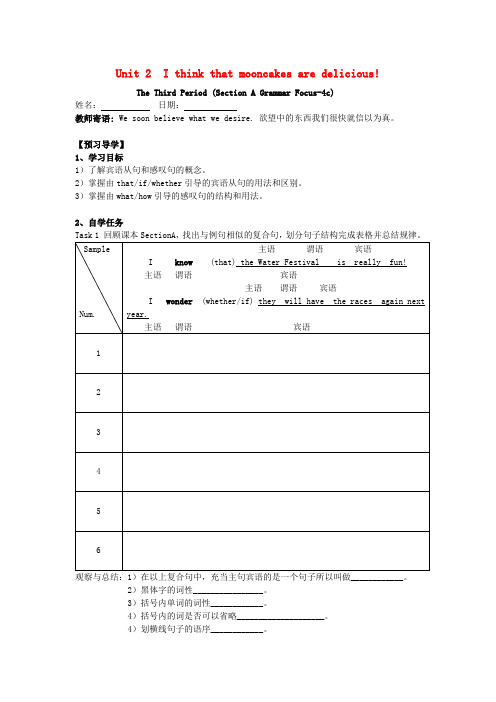
Unit 2 I think that mooncakes are delicious!The Third Period (Section A Grammar Focus-4c)姓名:日期:教师寄语: We soon believe what we desire. 欲望中的东西我们很快就信以为真。
【预习导学】1、学习目标1)了解宾语从句和感叹句的概念。
2)掌握由that/if/whether引导的宾语从句的用法和区别。
3)掌握由what/how引导的感叹句的结构和用法。
2、自学任务Task 1 回顾课本SectionA,找出与例句相似的复合句,划分句子结构完成表格并总结规律。
观察与总结:1)在以上复合句中,充当主句宾语的是一个句子所以叫做____________。
2)黑体字的词性________________。
3)括号内单词的词性____________。
4)括号内的词是否可以省略____________________。
4)划横线句子的语序____________。
5) 复合句的结构________________________________________________。
总结:1) 当从句是____________时,用that引导宾语从句。
2)当从句是___________ 时,用whether/if引导宾语从句。
3)一般情况whether/if可以互换,但当句子中出现or not 时必须用_____________。
4)由that引导的宾语从句中,主句的谓语动词_______________________。
由whether/if引导的宾语从句中,主句的谓语动词_______________。
Task 4 观察由how/what引导的感叹句,总结感叹句结构。
【课堂活动】Step 1 Make up as many sentences as you can (quick response) Step 2 Activity 4a1) Write sentences using the words given.2) Discuss in groups and present the answers on the blackboard.Step 2 Activity 4b1) Read the passage and underline the objective clauses.(check in group)2) Write your own sentences about Mother ’s Day and Father ’s Day using objectiveclauses. I know … I think … I believe … I wonder …Step 3 Activity 4c1) Make a survey about which festival do they like best in group. 2)Report to the class using objective clauses.e.g. In our group, David ’s favorite festival is …He thinks that …【训练反馈】。